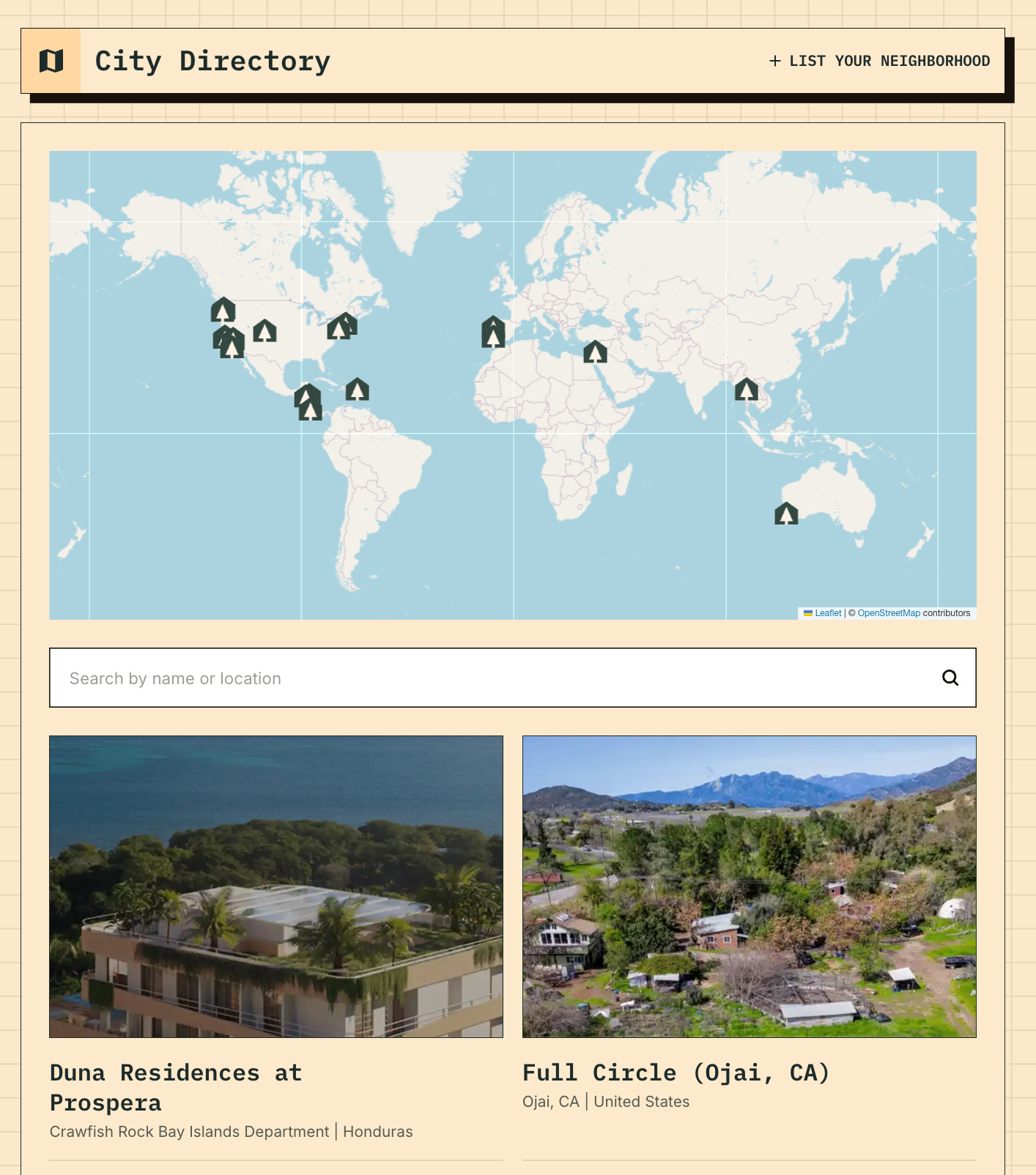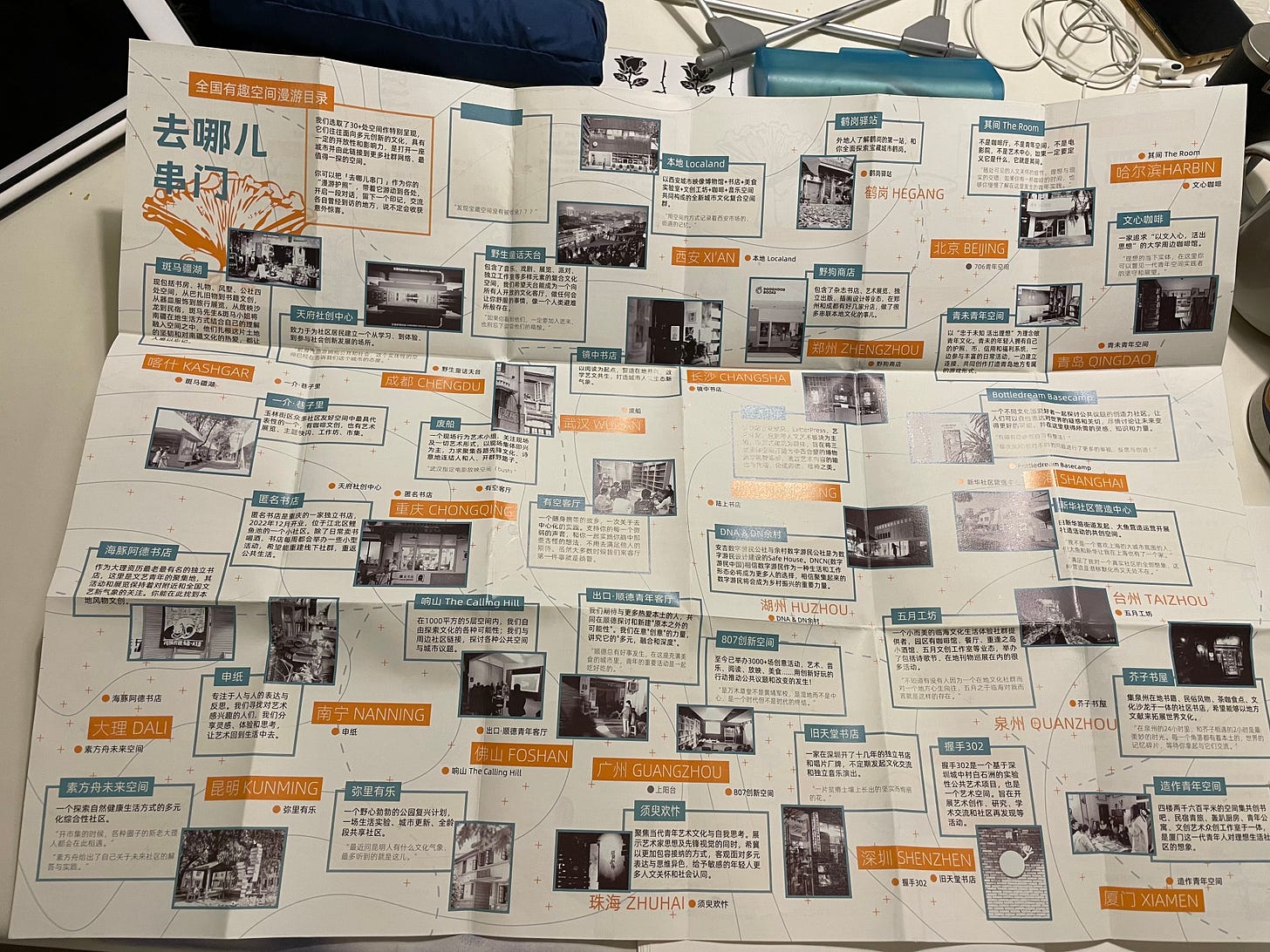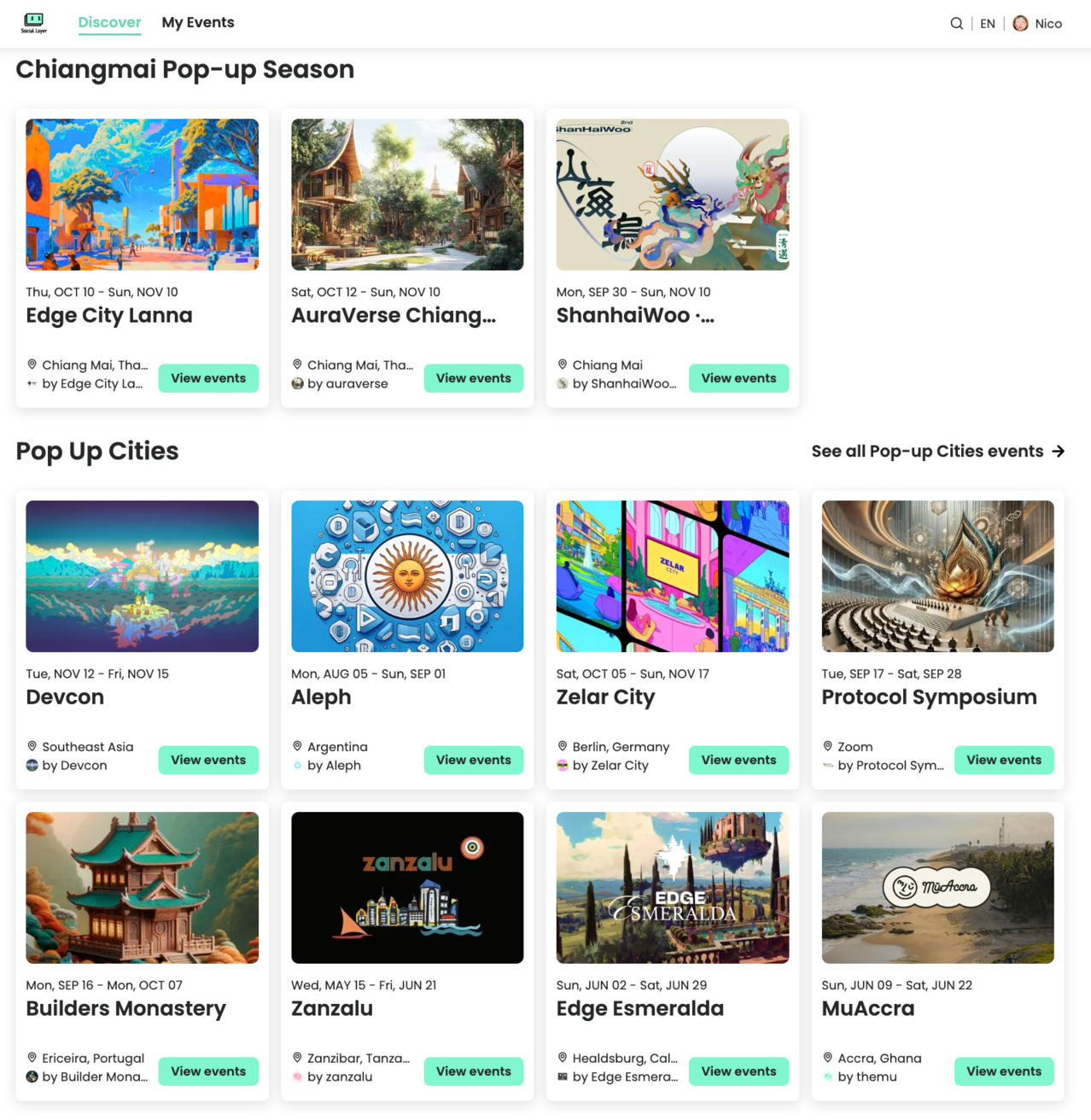Building A Search Engine for Communities?
Pop-up Cities, Third Spaces, Intentional Coliving Communities, Artist Collectives, What, When, Where and How?
Imagine a World…
Where you can pop into any country, city, suburbs, or wild nature, and find places and people really aligned with you, they share the same culture that you love, maybe you can end up collaborating and becoming great friends.
Solid friendship often takes years to curate, in the age of fast media and information growth, sometimes our relationships can be transactional, stay at the surface level, we might have lots of friends yet no deepened relationships at all.
Intentional communities and pop-up gatherings have become a very popular way to foster deep connections within a relatively short amount of time.
This blog, Grid Free Minds, is launched alongside Agartha, a global map of ‘Intentional Communities for Creative People’. These communities include Third Spaces like Gray Area in San Francisco, art residencies like Lios Lab in Poland, or Community technology spaces like Akasha Hub in Barcelona.
They are like portals to a different world. Once you stumble upon one of these, they have the potential to radically transform the way you think, the things you believe, the people you’re with, and the work you do. You may fully immerse yourself in these containers, and build life long friendships within a few months. You may find mission-aligned friends quite easily after just arriving to a new city.
We are social creatures, our environment can define how we live, think and act. Our immediate communities almost have omniscient powers over us. If we want to live a more aligned life, the best we can do is to choose wisely what communities to surround ourselves with.
Mars College had strong influence over me, we spent every day together for 3 months, building art, learning to live off-grid, brainstorming on open source tech and playing with AI models, among all the shenanigans, the immersed co-living really created a sense of family.
But Mars College isn’t for everyone, it might be too weird, harsh and demanding for most people I know. What are other ‘portals’ out there that can transform you to a different reality? Where are ‘containers’ that you can pop into, feel accepted and inspired? And how can you skip years of searching and easily find them?
Defining the Right Communities
How can more people experience a sense of belonging with ideologically aligned communities, and what are the commonalities among the communities that support individual freedom and communal harmony?
The communities that I find fascinating could be defined as ‘Protopian’ communities, they might include anarchy punks building off-grid shelters in the desert, gallery spaces hosting weekly art workshops at city centers; or regenerative villages intentionally living together, building compost piles and growing their own foods.
These communities are vastly different on the surface, but there are something underlying them that smells the same. For one, they offer something traditional universities, companies, sports clubs or meetups do not offer. They are often built by idealists and Protopians — people driven to make impacts, change the world by changing the way we live. They are ‘regens’, ‘punks’, the DIYers, the fringe artists, the open source hackers, maybe a little bit of all.
The mission of Agartha is to collect these communities, connect them with more people who would really benefit from discovering them.
Landscape of Different Types of Communities: From Pop-up Cities to Intentional Co-living
Pop-up city is a new phenomenon started with Zuzalu, an idea started by Vitalik and other key figures in the Ethereum ecosystem. They are month-long containers for people to live and work together, share ideas, cross paths, become friends, collaborators, partners.
Earlier this year, I attended Edge Esmeralda, a pop-up city held at the town of Healdsburg. For a month I lived with many people I never met before, we became great friends and collaborators, and I started exploring many other pop-up cities in this ecosystem.
At Edge Esmeralda I briefly met Paul Millard, who wrote about the Future of Cities in which he gave a very elaborate and curious investigation about Pop-up cities. I highly recommend his book The Pathless Path. I also reconnected with Jon Hills from Cabin, who have also been doing amazing research about pop-up villages, aside from running Cabin, a great resource for discovering communities.
Phill Levin gave a workshop at Edge Esmeralda about his new company Live Near Friends, where he shared vision to enable more people to live within close communities and his learnings on co-living running Raddish and Supernuclear.
Edge Esmeralda used Social Layer to create a shared calendar that all participants can add events to. The app is used by many pop-up cities to create emergent, bottom-up communal events. I became close with the core team of Social Layer at Edge Esmeralda, and through them I was able to discover a whole landscape of pop-up city communities all over the world.
These pop-up cities are sometimes hosted by one organizer, sometimes they’re co-created by multiple projects. Their duration varies from one week to a few months.
My experience at Edge Esmeralda was incredible, it felt like another ‘portal’ that opened up so many possibilities for me. Later I soon discovered a broad landscape of pop-up cities through Social Layer. It’s a new phenomenon and it’s rapidly expanding.
Designing Categories for Communities 🤔
Pop-up cities offer something Agartha communities also offer, and they sort of attract the same kind of people, the kind that are slightly more radical, idealistic, progressive, ‘Protopian’.
It’s also no surprise that this way of gathering are passionately adopted by the Ethereum ecosystem. Leading builders of decentralized protocols and permissionless cryptography are mostly at heart cypherpunks, which also fit into the archetype of idealists.
I have been thinking on the best way to design a ‘search engine’ for this ecosystem. Firstly, how can we properly categorize all these communities and allow people to search, browse them in ways that make sense?
We can of course create notion databses, links, magazines, but none of these would allow this way of gathering information to scale. It can also get quite overwhelming having to go thru a massive list and lose them among other massive lists — can we have the machines do this work?
To create the right ‘search engine’ there needs to be a simple UX that somehow contains quite complex types of data, they vary in duration, frequency, location, scale, cost, ethos… Because Nobody wants to click through 10 buttons to get to the information they want.
Living together with someone for months can make you lifelong friends, so would meeting someone once a week. Sometimes a community gather at one place forever, sometimes they meet at various places for various reasons, but there is a sense of ‘the gang’, ‘the crew’, ‘the brand’ as it is always more about the people than the places.
I’d like to summarize the fundamental community ‘types’ into the following:
Network — a network is also a collective / brand, it’s an abstract container for a community of people, usually a company but not required. For example: Edge City, Cabin, Funding the Commons, SeeDAO, 706
Event — a one-time or repetitive single event, from 1 day long to months long focused intentional gathering. For example: Edge City Lanna, Funding the Commons Conference, SeeDAO Meetup, 706 Movie Premiere Event, Mars College.
Hub — a physical location, sometimes this location itself is the chosen container for communities, sometimes this is independent from the community. For example: Feÿtopia is a brand, Chateau Du Feÿ is the hub where Feÿtopia is happening, Feÿtopia can also happen outside of Chateau Du Feÿ. Cabin Node 0 is a hub, Cabin is a Network
People — members of collective or brands, attendees of events. Having a space to display member’s information is useful to build a web of trust.
This category can be a foundation for building up convenient user flow for exploring these communities.
Leveraging LLMs in the Design
With the help of AI language models, we can also create personalized recommendations to explore these communities.
Sometimes you might not care about where / when / how much it costs, as long as the right people are there. Sometimes you just want to go to a place that’s convenient, affordable and fit into your busy schedule. Sometimes you might want to have a random roll in life and just go with the wind.
Culture and vibes are a complex contexts, maybe they are related to the location, type of community, duration, among many other things.
LLM could be a great way to experiment recommendations that can serve the specific needs of individuals on a more abstracted level.
Buildspace (sadly shut down their platform recently) built a really awesome communal tool that aggregates information of many talented, motivated builders all over the world with expertise among many fields and used a LLM to create conversational recommendations.
I have built a similar prototype with the Eden team for Agartha to help recommend personalized communities to our members, right now if you go to the Agartha Discord, you can tag the Agartha bot and ask for recommendations for communities to visit.

Based on these category principles, we can hopefully create a functional and simple search engine and an interface that anyone can use to find the communities they deserve.
Then what? In order to decentralize the curation process, we need to design verification (‘attestation’) system for a web of trust.
Building Web of Trust 🕸️
I can manually add all the communities I know, but that would only be my list, how can I enable everyone else to add their communities freely? What are the criterias? How do approval systems work?
How can we decentralize the curation process by creating a shared standard and automate ‘vibe check’ to this standard?
Many pop-up cities and intentional communities are built by ripple effects of a social web of trust, where it started with an original group of friends rippling out to friends of friends and so on. In the end, you might meet someone you never met, but you know you trust them, because your friends do.
With the right protocol we could even map out ‘trust scores’ for communities based on how many of our friends trust them.
This can be helpful not only for intentional communities, but for applications for jobs, grants, and all sorts of opportunities.
The concept of the "Web of Trust" originated with Pretty Good Privacy (PGP), a system for securing communications through cryptography. Many web3 projects such as BrightID are experimenting with building Web of Trust as a foundamental protocol to help facilitate better coordination among decentralized projects.
Web3 might not be for everyone, and this protocol can be built without any web3 technology. The purpose is to ‘protocolize’ and decentralize social trust, preventing bad actors without inviting surveillance from big brother.
A really inspiring peer-supported insurance project in the Netherlands CommonEasy has built a mutual-aid tool for trusted communities, this is completely local and off-chain. Everyone on this platform are invited by someone. With users being able to trust their friends and the community of their friends, they can choose to attribute funds to support different layers of trust, eventually ‘replacing’ expensive commercial insurance by directly supporting each others.
This topic probably deserves another whole article to explore. It is also difficult to prove validity of these speculative theories without first implementing real users into a real ecosystem.
Therefore, my first goal would be to build out the ‘community aggregator’ as mentioned above, making a product that is informative, useful and super simple to navigate as a way to onboard users.
Once we have that, we can start to experiment with all sorts of game theories to build out a web of trust. ✨
Notes on the Mission
The core mission here is really to bring people to the places they deserve to be. Some people may happen to love the places they are born and never want to leave, that is amazing, but some people might have to travel really far to find the places they feel belong to. We are incredibly lucky today that this is even an option.
Plato imagined ‘The Republic’ to be an ‘Utopia’ when each individual is at a position that fits them and make them happy, I would suggest that in today’s words that would mean a world where everyone are radically aligned with their Ikigai, and we all need the right soil to curate that.
Now Utopia is out of touch, but at least we can bring our world closer to Utopias by building Protopias. 💕
Big hugs!
If this idea resonates with you, please comment, or dm me on Instagram or Twitter @syntonikka for collaboration inquiry, if you’ve also given this a lot of thoughts, I’d love to hear them :)








